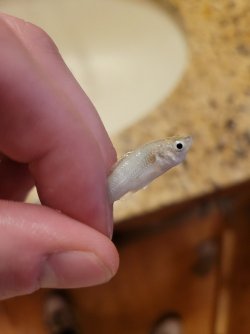RumAndRedbull
New Member
I'm a relatively experienced fish keeper, however in the past year I have moved into a new home out of state and haven't kept fish up until the past month.
It's a small, fairly basic setup, however, I have mollys. It's my first time keeping livebearers other than guppies, but since I've gotten them from this new fish store, they have been dying one by one everyday.
I've checked the water parameters daily, but non of the other fish seem to be effected by them either. (As well as they are all in safe range)
So I assume parasites, since all the mollys came from the same tank. Probably should have quarantined first...Here is an image if a spot I found. Thoughts?
It's a small, fairly basic setup, however, I have mollys. It's my first time keeping livebearers other than guppies, but since I've gotten them from this new fish store, they have been dying one by one everyday.
I've checked the water parameters daily, but non of the other fish seem to be effected by them either. (As well as they are all in safe range)
So I assume parasites, since all the mollys came from the same tank. Probably should have quarantined first...Here is an image if a spot I found. Thoughts?


